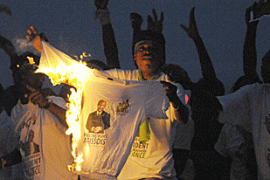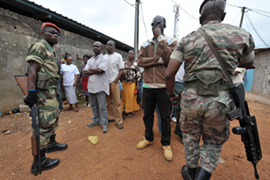Gabon candidates claim poll victory
Three frontrunners in presidential elections all say they have majority of votes.

Bongo, whose father ruled the oil-rich nation for more than 40 years, is seen as the top contender in the presidential race, with a fractured opposition expected to hand him the advantage.
Poverty line
He earlier expressed hope that he would gain an absolute majority in a field of 18 candidates.
“We think we are going … to get very good results,” he told the private Impala television channel.
He said 50 per cent was “the target we have set ourselves”.
Gabon is sub-Saharan Africa’s fourth-biggest oil producer, the world’s third-biggest provider of manganese and Africa’s second-biggest wood exporter, but an estimated 60 per cent of the population lives below the poverty line.
Bongo and the other frontrunners, Andre Mba Obame and Pierre Mamboundou, have all promised a fairer distribution of the country’s natural resources.
A total of 23 politicians were originally in the race, but Cassimir Oye Mba resigned from the race on Sunday afternoon, saying he was worried the poll’s outcome would trigger violence.
‘Worrying signals’
Opposition candidates have warned they will not accept a Bongo victory, Adow said, and there are fears that a win by Bongo could ignite lingering anger over the huge personal fortune accumulated by his father.
 |
| Despite tight security in the capital, many have left the city for fear of violence [AFP] |
A group of leading intellectuals in Gabon has urged all sides not to resort to violence after the election, pointing to “numerous worrying signals” and warning of “confrontations” in the wake of the vote.
Bongo told Radio France International ahead of the vote: “It is clear that we cannot accept disorder … We shall use all the institutions that the law authorises us to use – the street belongs to no one.”
Many candidates have questioned the electoral roll, saying that the official figure of 813,164 eligible voters in a country of 1.5 million was too high.
More than 300 observers were accredited for the vote, including representatives from the African Union, the Organisation of the Islamic Conference and a global grouping of francophone countries.